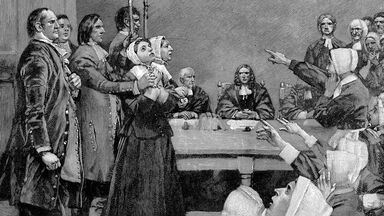Parry Definition
(fencing) A simple defensive action designed to deflect an attack, performed with the forte of the blade.
A surname.
Origin of Parry
-
From earlier parree, from Middle English *parree, *paree, from Old French paree (“preparation, ceremony, parade"), from Medieval Latin parāta (“preparation, parade"), from Medieval Latin parāre (“to ward off, guard, defend, prepare, get ready"). More at pare. The English verb to parry is taken from the noun.
From Wiktionary
-
Probably from French parez imperative of parer to defend from Italian parare from Latin parāre to prepare perə-1 in Indo-European roots
From American Heritage Dictionary of the English Language, 5th Edition
-
Alternative etymology derives the verb parry from French parez !, the imperative form of parer (“to fend off"), ultimately from the Medieval Latin parāre. See above.
From Wiktionary
-
Anglicised from Welsh ap Harri, "son of Henry".
From Wiktionary
Related Articles
Find Similar Words
Find similar words to parry using the buttons below.
